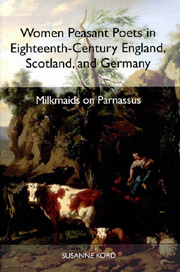Book contents
- Frontmatter
- Contents
- List of Illustrations
- Acknowledgments
- Introduction: Aesthetic Evasions and Social Consequences
- 1 Back to Nature: Bourgeois Aesthetic Theory and Lower-Class Poetic Practice
- 2 The Wild and the Civilized: Poet Making
- 3 The Life As the Work: Counterfeit Confessions, Bogus Biographies, Literary Lives
- 4 A Literature of Labor: Poetic Images of Country Life
- 5 Inspired by Nature, Inspired by Love: Two Poets on Poetic Inspiration
- 6 Of Patrons and Critics: Reading the Bourgeois Reader
- Conclusion: On the Gender and Class of Art
- Appendix: Short Biographies of Women Peasant Poets
- Works Cited
- Index
1 - Back to Nature: Bourgeois Aesthetic Theory and Lower-Class Poetic Practice
Published online by Cambridge University Press: 05 February 2013
- Frontmatter
- Contents
- List of Illustrations
- Acknowledgments
- Introduction: Aesthetic Evasions and Social Consequences
- 1 Back to Nature: Bourgeois Aesthetic Theory and Lower-Class Poetic Practice
- 2 The Wild and the Civilized: Poet Making
- 3 The Life As the Work: Counterfeit Confessions, Bogus Biographies, Literary Lives
- 4 A Literature of Labor: Poetic Images of Country Life
- 5 Inspired by Nature, Inspired by Love: Two Poets on Poetic Inspiration
- 6 Of Patrons and Critics: Reading the Bourgeois Reader
- Conclusion: On the Gender and Class of Art
- Appendix: Short Biographies of Women Peasant Poets
- Works Cited
- Index
Summary
Visionaries: The Artist As Servant, God, or Vegetable
The development of bourgeois aesthetic thought in England, Scotland, and Germany was intricately linked with the social ascendancy of the middle classes in these countries. The eighteenth century is commonly acknowledged as the first century marked by the bourgeois author's emancipation from aristocratic patronage; linked with that notion are two assumptions that are central to modern understanding of eighteenthcentury aesthetic thought. First, the theory that bourgeois literature, newly liberated from its seventeenth-century mercenary and submissive context, was now free to aspire to the sublime and the eternal — the hallmarks of all eighteenth-century art forms that were, and are, acknowledged to be Art. Second is the idea that bourgeois poetologies emphasizing the “natural” and seeking their inspiration in the “folk” were developed in express opposition to the aristocracy, an opposition that is, in various contexts, interpreted to have been social and political as well as cultural. German aesthetics, in the second half of the century, clearly took its cue from the English context; conversely, some German poetological thought found its way back across the channel. For this reason, it is generally assumed that these two central ideas — the sublime as a new, distinct quality of postpatronage poesy and culture as a means of distinguishing the middle classes from the aristocracy — determined, to a great degree, developments in bourgeois aesthetics on both sides of the channel.
- Type
- Chapter
- Information
- Women Peasant Poets in Eighteenth-Century England, Scotland, and GermanyMilkmaids on Parnassus, pp. 19 - 47Publisher: Boydell & BrewerPrint publication year: 2003



